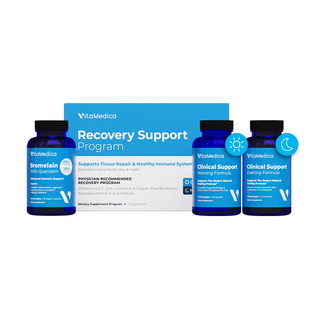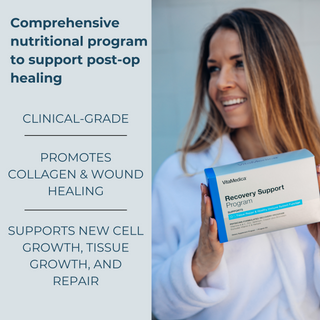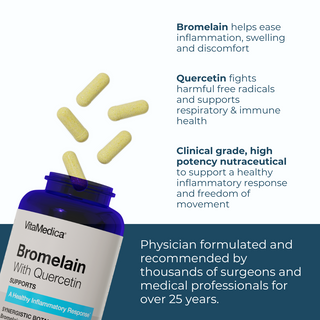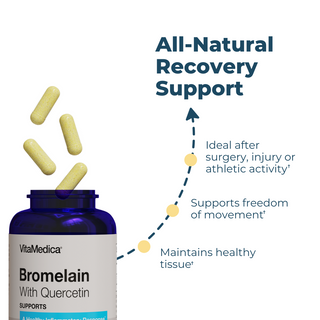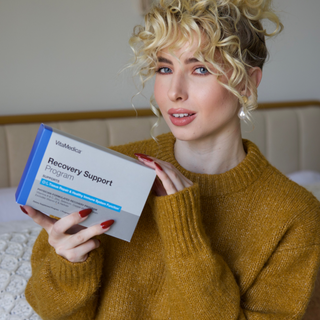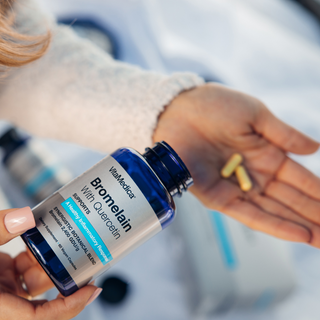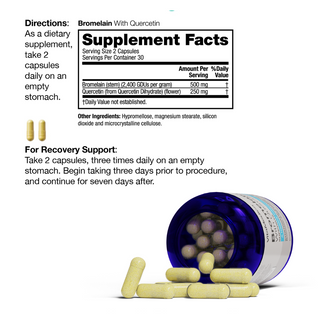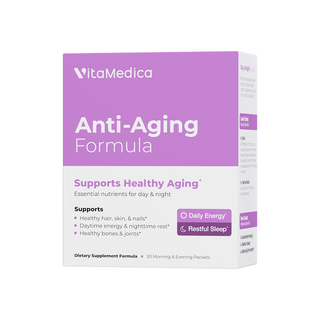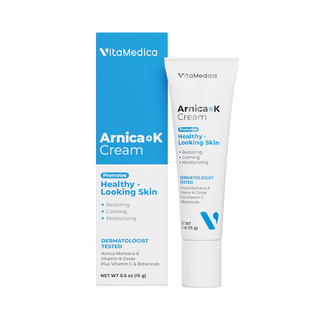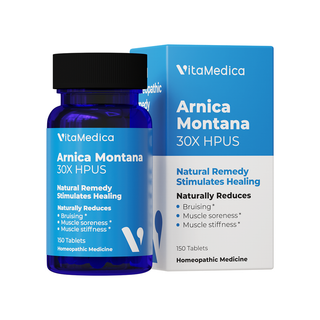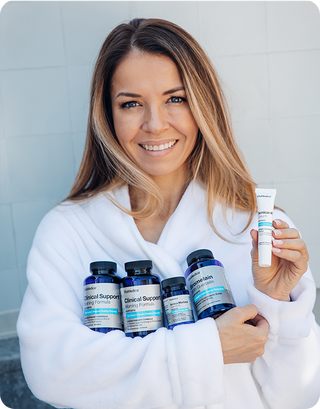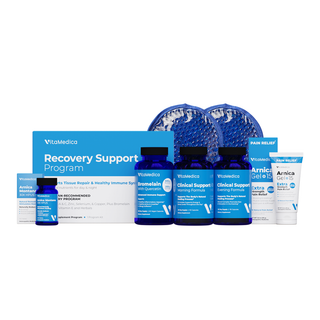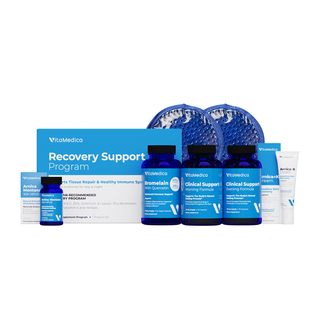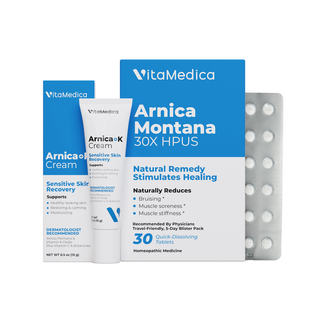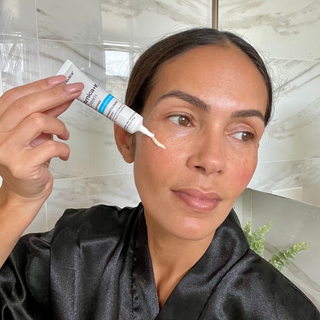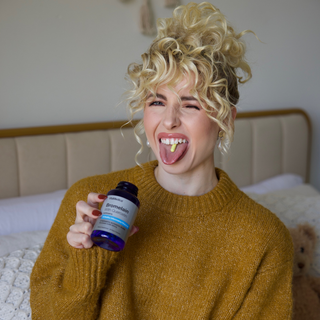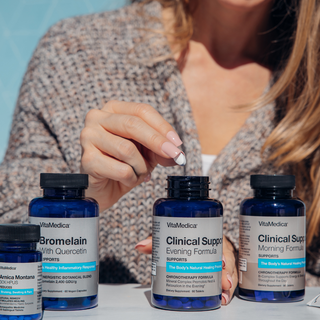Trusted by surgeons for over 25 years, key components like Vitamin A, Vitamin C, zinc, selenium, and bioflavonoids promote healthy cell growth, tissue maintenance, collagen formation, and immune function. The B-Complex aids in moderating the stress response during physical stress, while antioxidants help reduce oxidative load. The inclusion of Bromelain with Quercetin is especially beneficial after physical stress and athletic activity, supporting tissue and joint health. Notably, the Recovery Support Program excludes vitamin E and other herbals that could have adverse effects when taken before surgery, ensuring a safe and effective recovery.*
- Vitamin A plus beta-carotene supports healthy cell growth and maintenance of epithelial tissue.*
- Vitamin C supports healthy tissue growth and collagen formation.*
- Zinc plays a key role in maintaining healthy immune function, protein synthesis, and collagen formation. Selenium, bioflavonoids and other antioxidants deactivate unstable free-radicals.*
- The B-Complex helps to moderate the stress response function during periods of physical stress.*
- Antioxidant vitamins and minerals deactivate free-radicals and help reduce oxidative load.*
- Bromelain with Quercetin is ideal for use after physical stress and athletic activity to help maintain tissue and joint health.*
- Excludes vitamin E and other herbals which can have adverse effects when taken before surgery.*
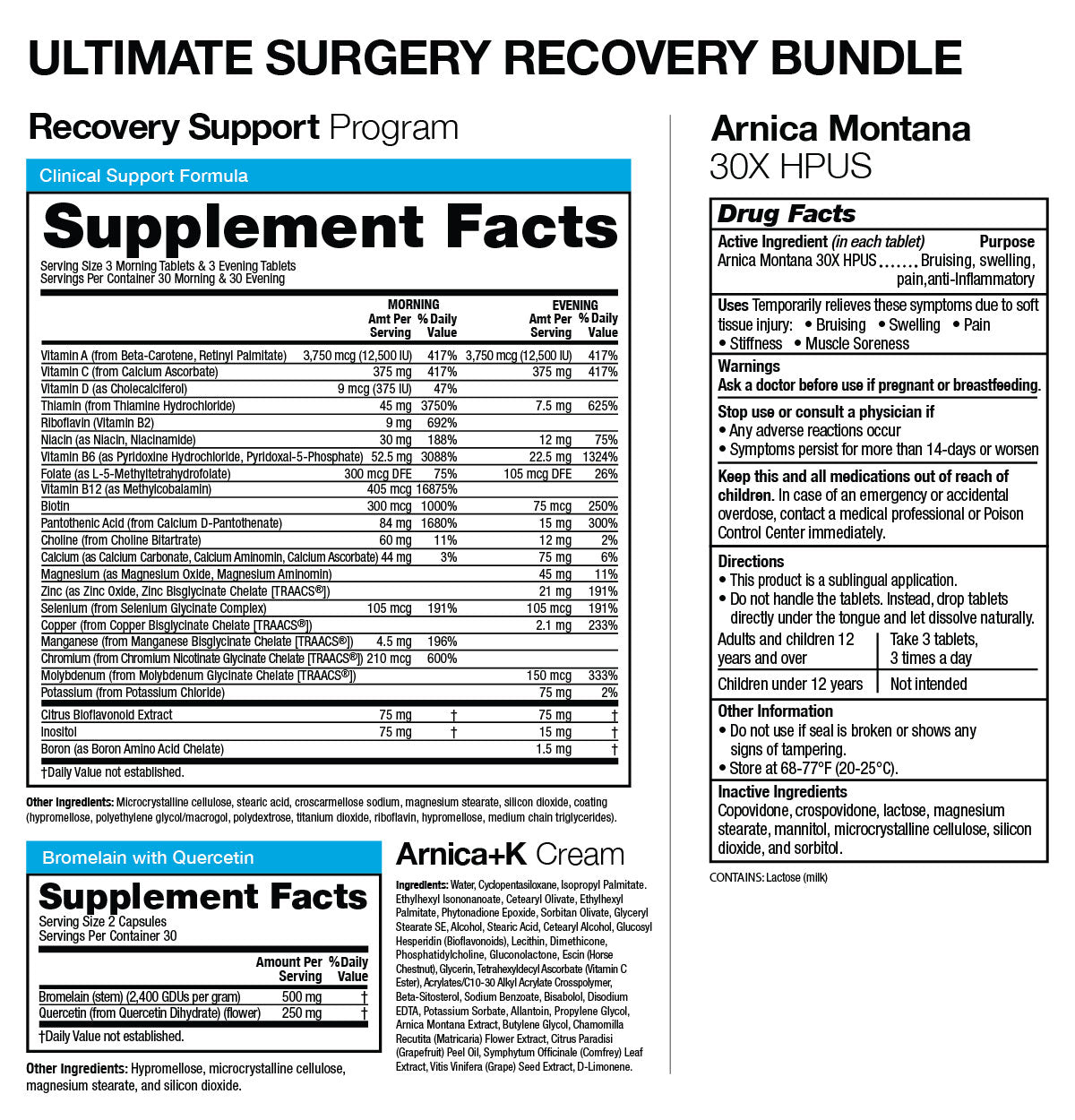
DIRECTIONS:
CLINICAL SUPPORT MORNING & CLINICAL SUPPORT EVENING: As a dietary supplement, take three capsules of Clinical Support Morning Formula with breakfast or lunch. Take three capsules of Clinical Support Evening Formula with dinner or before bedtime. Begin taking CLINICAL SUPPORT up to two weeks prior to anticipated physical stressors and for at least two weeks after.
BROMELAIN WITH QUERCETIN: Take two capsules, three times a day between meals. Begin taking Bromelain with Quercetin three days prior to anticipated physical stress and continue for seven days. If you notice a “vinegar-like” smell after you open your bottle of Bromelain this is normal. This supplement is formulated with a high-potency Bromelain, which is derived from the pineapple plant and contains sulfur. We recommend leaving the bottle cap off for 20 to 30 minutes after opening and the smell should dissipate.
WARNINGS:
CLINICAL SUPPORT MORNING & CLINICAL SUPPORT EVENING contain vitamin A. If you are presently taking a vitamin A containing medication for the treatment of acne, please refrain from taking CLINICAL SUPPORT until the end of the treatment cycle. This product also contains niacin, which may cause temporary redness of the skin and flushing.
BROMELAIN WITH QUERCETIN should not be used in individuals with a history of abnormal heart rhythms (arrhythmias) or taking blood thinners. Those who are allergic to pineapple should avoid bromelain. Individuals with other allergies may experience an allergic reaction to bromelain.
Not manufactured with wheat, milk, soy, egg, fish, shellfish, peanuts or tree nut ingredients. Produced in a GMP-certified facility that processes other ingredients containing these allergens.
Storage: Store in a cool, dark place.
What is the primary benefit of using Recovery Support Program?
Recovery Support Program is a comprehensive pre-operative and post-operative nutritional supplement system designed specifically for patients undergoing operative procedures. Recovery Support Program provides nutrients to speed wound healing, support the immune system, prevent infection, minimize inflammation, and reduce bruising.
What makes VitaMedica’s Recovery Support Program unique?
A combination of high-quality, targeted ingredients, at dosing levels that support healing. The targeted nutrients in Recovery Support Program were selected based on extensive use of the best evidence and research currently available in the nutritional science literature. Recovery Support Program is unique in that it provides nearly all of the key nutrients that are beneficial for surgery in a single convenient kit. Critically, it excludes nutrients such as vitamin E which are found in a typical multi-vitamin supplement, and should not be taken during the peri-operative period.
What products comprise Recovery Support Program?
Inside the product box for Recovery Support Program are two products: Clinical Support Program (provided in a Morning and Evening formulation) and Bromelain with Quercetin.
Who should use Recovery Support Program?
Recovery Support Program provides nutrients to promote wound healing and support the immune system. Thus, the program is particularly beneficial for patients who are recovering from surgery, injury, or trauma.
Who should not use Recovery Support Program?
Nutritional supplements have an excellent safety track record. However, certain individuals should seek the advice of their doctor before beginning any nutritional supplement program, particularly diabetics and pregnant or lactating women. Please refer to the Directions section for more information on precautions and contraindications.
What is the importance of bromelain during the peri-operative period and how does it work?
Bromelain is a proteolytic enzyme (capable of digesting protein) that is extracted from the pineapple stem. Bromelain’s most common application is in the treatment of inflammation and soft tissue injury. Bromelain inhibits hormone-like compounds called prostaglandins that cause inflammation and promotes the formation of anti-inflammatory prostaglandins. Bromelain is also helpful in breaking up hematomas, or a collection of blood that can sometimes occur from soft tissue injury.
VitaMedica’s bromelain supplement also contains quercetin. What is quercetin?
Quercetin (que-er-ce-tin) is a type of flavonoid (plant pigments that give plants & fruits their color) that has anti-inflammatory and antioxidant properties. The combination of quercetin and bromelain is used to effectively manage the body’s natural inflammatory response.
Bromelain’s strength is measured in milk clotting units or gelatin dissolving units. What do these terms mean?
Unlike vitamins and minerals, which are measured in a variety of ways including milligrams (mg), micrograms (mcg), and International Units (IU), bromelain is measured either by milk clotting units (MCUs) or gelatin dissolving units (GDUs). Since bromelain is an enzyme, MCUs and GDUs are used to measure its strength in terms of how quickly it can break down a protein. MCUs and GDUs are used somewhat interchangeably: 1 GDU equals 1.5 MCU. To be effective, at least 2,000 MCUs must be consumed in divided amounts over the course of the day.
Why is Clinical Support Program provided in a two-part formula?
The body uses certain nutrients most effectively when they are replenished throughout the day. Unlike their fat-soluble counterparts, water-soluble nutrients such as vitamin C and the B-Complex can’t be stored in the body and any excess that is not needed at the time of ingestion is excreted through the urine. Taking these types of nutrients in divided doses is the only way to ensure a sufficient intake that will promote nutrient delivery and support activity levels. Clinical Support Program meets this need with its two-part Chronotherapy Delivery System (CDS) formula. For this reason, the Morning formulation contains the bulk of vitamins (especially the B-complex) to support daytime activity levels, while the Evening formulation contains the bulk of minerals to promote rest and relaxation.
Clinical Support Program is formulated with vitamin A. What role does vitamin A have in the healing process?
Vitamin A, or retinol, is a fat-soluble essential nutrient that must be obtained through diet or supplementation. Vitamin A is most well-known for its role in eye health, growth and development, reproduction, and immune system function, but is also vital for wound healing by helping to maintain and repair epithelial tissue. Vitamin A partially reverses immune system depression, which can help to reduce the chance of infection. The body can obtain vitamin A by converting carotenes into retinol. Carotenes are a group of fat-soluble compounds are responsible for giving many fruits and vegetables their color. Many carotenes can be converted into retinol including beta, alpha, and gamma-carotene. Compared to retinol, the carotenes have significant antioxidant protective benefits.
The amount of vitamin A in Clinical Support Program seems high. Is this level within a safe range?
Yes. Although the amount of vitamin A in Clinical Support Program is above the Daily Value of 5,000 IUs, the amount is very safe. Fat-soluble vitamins such as pure vitamin A (palmitate), vitamin D, vitamin E and vitamin K, are stored in the liver and fatty tissues of the body so toxicity can become a problem if an excessive amount is taken. In the case of vitamin A, toxicity may occur in adults when more than 10,000 IUs of palmitate is taken on a daily basis for several years. Vitamin A is available either in its pure form called palmitate or through carotenes with pro-vitamin A activity. This means that when needed, the body converts the carotene into vitamin A; when not needed, an excess is excreted through the urinary tract. This is an important distinction as toxicity issues are not associated with carotenoids.
Clinical Support Program is formulated with vitamin C. What role does vitamin C play in the healing process?
Clinical Support Program contains a much larger dose of vitamin C than the Daily Value of 60 mg and more than the 100 mg typically found in the average multi-vitamin & mineral supplement. Vitamin C, or ascorbic acid, is an important water-soluble nutrient that provides antioxidant protection. It also plays a primary role in the formation of collagen and is needed for tissue growth and repair. This nutrient promotes wound healing, protects against blood clotting and bruising, and enhances immunity.
Clinical Support Program is formulated with bioflavonoids. What are bioflavonoids and what role do they play in the healing process?
Bioflavonoids refer to a group of substances responsible for giving fruits and vegetables their color. These water-soluble nutrients include citrin, rutin, and hesperidin as well as other flavones and flavonols. Bioflavonoids have several properties including anti-inflammatory, anti-allergenic, antiviral, and anticarcinogenic. Bioflavonoids also strengthen the walls of capillaries, thereby preventing bruising, and help build resistance to infection. In addition, bioflavonoids are potent antioxidants that enhance the absorption of vitamin C and prevent this nutrient from being oxidized.
Clinical Support Program is formulated with the B-complex of vitamins. What role does the B-complex play in the healing process?
The B-complex refers to the water-soluble family of B-vitamins including B1 (thiamine), B2 (riboflavin), B3 (niacin, niacinamide), B5 (pantothenic acid), B6 (pyridoxine), B12 (cobalamin), folic acid, PABA (para-aminobenzoic acid), biotin, choline, and inositol. The B-complex is so named because they are commonly found together in foods. Because the functions of the B-vitamins are so interrelated, it is best to take them as a complex and not as single supplements. As a group, the B-complex is important for circulatory, digestive, and nervous system function, energy and adrenal hormone production, and red blood cell formation. The B-complex, also known as the “anti-stress” vitamins, is indicated during periods of stress including after an operation or surgical procedure.
Clinical Support Program is formulated with zinc. What role does zinc play in the healing process?
Zinc is an antioxidant essential for protein synthesis and collagen formation. This mineral also helps to promote the healing of wounds and increases the absorption of vitamin A.
Clinical Support Program is formulated with copper. What role does copper play in the healing process?
Copper is a trace mineral that aids in the formation of bone, hemoglobin, and red blood cells. Copper works in balance with vitamin C and zinc to form elastin and is essential for the formation of collagen. Copper is necessary for the function of an enzyme which is required to cross-link collagen and elastin.
When should I begin taking and when do I stop taking Recovery Support Program?
Recovery Support Program is begun 14 days prior to surgery and is continued 14 days following surgery (one-month program). An insert with detailed instructions for taking each of the products in Recovery Support Program is included inside the product box. For more information, refer to our Surgery Supplements Guidelines.
Why is it recommended that a patient stop taking all other nutritional supplements 14 days prior to and 14 days following surgery?
While nutritional supplements are quite safe, the use of certain supplements around the time of surgery is not recommended. For example, considerable research has shown that vitamin E plays a role in the prevention of heart disease due to its ability to thin the blood. While this is a benefit overall, it can be problematic during surgery. Other supplements such as fish oil, ginkgo, garlic, and ginseng also thin the blood, which in turn can promote bleeding. Supplements such as St. John’s Wort, while beneficial for mild depression, can intensify the anesthetic effect. Stopping all supplements 14 days prior to surgery provides enough time for these nutrients to be eliminated from the body. These supplements are not necessary 14 days following surgery because the Recovery Support Program provides all the nutrients needed for healing and repairing the body.
Why is Recovery Support Program only a one-month program?
Recovery Support Program is targeted specifically for the peri-operative period. It includes nutrients such as vitamin A, vitamin C, bromelain, and Arnica Montana (optional) in appreciable amounts to optimize the surgical outcome. While these nutrients are beneficial during the peri-operative period, it is not recommended that they be used on a long-term basis or in such high dosages. Likewise, Recovery Support Program excludes certain nutrients, such as vitamin E, that should be taken daily for long-term health and wellness.
Recovery Support Program: Morning & Evening Program + Bromelain with Quercetin
- Unit price
- /per
The Recovery Support Program is a trusted morning and evening regimen designed to bolster the body's natural healing processes and support a robust immune system. Provides comprehensive nutritional support for healing after surgery, cosmetic procedure or injury.*
The Recovery Support Program includes:
- Bromelain with Quercetin
- Clinical Support Morning Formula
- Clinical Support Evening Formula
Product update: Clinical Support Formula is now in capsule form, instead of tablets.
Adding product to your cart
Trusted by surgeons for over 25 years, key components like Vitamin A, Vitamin C, zinc, selenium, and bioflavonoids promote healthy cell growth, tissue maintenance, collagen formation, and immune function. The B-Complex aids in moderating the stress response during physical stress, while antioxidants help reduce oxidative load. The inclusion of Bromelain with Quercetin is especially beneficial after physical stress and athletic activity, supporting tissue and joint health. Notably, the Recovery Support Program excludes vitamin E and other herbals that could have adverse effects when taken before surgery, ensuring a safe and effective recovery.*
- Vitamin A plus beta-carotene supports healthy cell growth and maintenance of epithelial tissue.*
- Vitamin C supports healthy tissue growth and collagen formation.*
- Zinc plays a key role in maintaining healthy immune function, protein synthesis, and collagen formation. Selenium, bioflavonoids and other antioxidants deactivate unstable free-radicals.*
- The B-Complex helps to moderate the stress response function during periods of physical stress.*
- Antioxidant vitamins and minerals deactivate free-radicals and help reduce oxidative load.*
- Bromelain with Quercetin is ideal for use after physical stress and athletic activity to help maintain tissue and joint health.*
- Excludes vitamin E and other herbals which can have adverse effects when taken before surgery.*

DIRECTIONS:
CLINICAL SUPPORT MORNING & CLINICAL SUPPORT EVENING: As a dietary supplement, take three capsules of Clinical Support Morning Formula with breakfast or lunch. Take three capsules of Clinical Support Evening Formula with dinner or before bedtime. Begin taking CLINICAL SUPPORT up to two weeks prior to anticipated physical stressors and for at least two weeks after.
BROMELAIN WITH QUERCETIN: Take two capsules, three times a day between meals. Begin taking Bromelain with Quercetin three days prior to anticipated physical stress and continue for seven days. If you notice a “vinegar-like” smell after you open your bottle of Bromelain this is normal. This supplement is formulated with a high-potency Bromelain, which is derived from the pineapple plant and contains sulfur. We recommend leaving the bottle cap off for 20 to 30 minutes after opening and the smell should dissipate.
WARNINGS:
CLINICAL SUPPORT MORNING & CLINICAL SUPPORT EVENING contain vitamin A. If you are presently taking a vitamin A containing medication for the treatment of acne, please refrain from taking CLINICAL SUPPORT until the end of the treatment cycle. This product also contains niacin, which may cause temporary redness of the skin and flushing.
BROMELAIN WITH QUERCETIN should not be used in individuals with a history of abnormal heart rhythms (arrhythmias) or taking blood thinners. Those who are allergic to pineapple should avoid bromelain. Individuals with other allergies may experience an allergic reaction to bromelain.
Not manufactured with wheat, milk, soy, egg, fish, shellfish, peanuts or tree nut ingredients. Produced in a GMP-certified facility that processes other ingredients containing these allergens.
Storage: Store in a cool, dark place.
What is the primary benefit of using Recovery Support Program?
Recovery Support Program is a comprehensive pre-operative and post-operative nutritional supplement system designed specifically for patients undergoing operative procedures. Recovery Support Program provides nutrients to speed wound healing, support the immune system, prevent infection, minimize inflammation, and reduce bruising.
What makes VitaMedica’s Recovery Support Program unique?
A combination of high-quality, targeted ingredients, at dosing levels that support healing. The targeted nutrients in Recovery Support Program were selected based on extensive use of the best evidence and research currently available in the nutritional science literature. Recovery Support Program is unique in that it provides nearly all of the key nutrients that are beneficial for surgery in a single convenient kit. Critically, it excludes nutrients such as vitamin E which are found in a typical multi-vitamin supplement, and should not be taken during the peri-operative period.
What products comprise Recovery Support Program?
Inside the product box for Recovery Support Program are two products: Clinical Support Program (provided in a Morning and Evening formulation) and Bromelain with Quercetin.
Who should use Recovery Support Program?
Recovery Support Program provides nutrients to promote wound healing and support the immune system. Thus, the program is particularly beneficial for patients who are recovering from surgery, injury, or trauma.
Who should not use Recovery Support Program?
Nutritional supplements have an excellent safety track record. However, certain individuals should seek the advice of their doctor before beginning any nutritional supplement program, particularly diabetics and pregnant or lactating women. Please refer to the Directions section for more information on precautions and contraindications.
What is the importance of bromelain during the peri-operative period and how does it work?
Bromelain is a proteolytic enzyme (capable of digesting protein) that is extracted from the pineapple stem. Bromelain’s most common application is in the treatment of inflammation and soft tissue injury. Bromelain inhibits hormone-like compounds called prostaglandins that cause inflammation and promotes the formation of anti-inflammatory prostaglandins. Bromelain is also helpful in breaking up hematomas, or a collection of blood that can sometimes occur from soft tissue injury.
VitaMedica’s bromelain supplement also contains quercetin. What is quercetin?
Quercetin (que-er-ce-tin) is a type of flavonoid (plant pigments that give plants & fruits their color) that has anti-inflammatory and antioxidant properties. The combination of quercetin and bromelain is used to effectively manage the body’s natural inflammatory response.
Bromelain’s strength is measured in milk clotting units or gelatin dissolving units. What do these terms mean?
Unlike vitamins and minerals, which are measured in a variety of ways including milligrams (mg), micrograms (mcg), and International Units (IU), bromelain is measured either by milk clotting units (MCUs) or gelatin dissolving units (GDUs). Since bromelain is an enzyme, MCUs and GDUs are used to measure its strength in terms of how quickly it can break down a protein. MCUs and GDUs are used somewhat interchangeably: 1 GDU equals 1.5 MCU. To be effective, at least 2,000 MCUs must be consumed in divided amounts over the course of the day.
Why is Clinical Support Program provided in a two-part formula?
The body uses certain nutrients most effectively when they are replenished throughout the day. Unlike their fat-soluble counterparts, water-soluble nutrients such as vitamin C and the B-Complex can’t be stored in the body and any excess that is not needed at the time of ingestion is excreted through the urine. Taking these types of nutrients in divided doses is the only way to ensure a sufficient intake that will promote nutrient delivery and support activity levels. Clinical Support Program meets this need with its two-part Chronotherapy Delivery System (CDS) formula. For this reason, the Morning formulation contains the bulk of vitamins (especially the B-complex) to support daytime activity levels, while the Evening formulation contains the bulk of minerals to promote rest and relaxation.
Clinical Support Program is formulated with vitamin A. What role does vitamin A have in the healing process?
Vitamin A, or retinol, is a fat-soluble essential nutrient that must be obtained through diet or supplementation. Vitamin A is most well-known for its role in eye health, growth and development, reproduction, and immune system function, but is also vital for wound healing by helping to maintain and repair epithelial tissue. Vitamin A partially reverses immune system depression, which can help to reduce the chance of infection. The body can obtain vitamin A by converting carotenes into retinol. Carotenes are a group of fat-soluble compounds are responsible for giving many fruits and vegetables their color. Many carotenes can be converted into retinol including beta, alpha, and gamma-carotene. Compared to retinol, the carotenes have significant antioxidant protective benefits.
The amount of vitamin A in Clinical Support Program seems high. Is this level within a safe range?
Yes. Although the amount of vitamin A in Clinical Support Program is above the Daily Value of 5,000 IUs, the amount is very safe. Fat-soluble vitamins such as pure vitamin A (palmitate), vitamin D, vitamin E and vitamin K, are stored in the liver and fatty tissues of the body so toxicity can become a problem if an excessive amount is taken. In the case of vitamin A, toxicity may occur in adults when more than 10,000 IUs of palmitate is taken on a daily basis for several years. Vitamin A is available either in its pure form called palmitate or through carotenes with pro-vitamin A activity. This means that when needed, the body converts the carotene into vitamin A; when not needed, an excess is excreted through the urinary tract. This is an important distinction as toxicity issues are not associated with carotenoids.
Clinical Support Program is formulated with vitamin C. What role does vitamin C play in the healing process?
Clinical Support Program contains a much larger dose of vitamin C than the Daily Value of 60 mg and more than the 100 mg typically found in the average multi-vitamin & mineral supplement. Vitamin C, or ascorbic acid, is an important water-soluble nutrient that provides antioxidant protection. It also plays a primary role in the formation of collagen and is needed for tissue growth and repair. This nutrient promotes wound healing, protects against blood clotting and bruising, and enhances immunity.
Clinical Support Program is formulated with bioflavonoids. What are bioflavonoids and what role do they play in the healing process?
Bioflavonoids refer to a group of substances responsible for giving fruits and vegetables their color. These water-soluble nutrients include citrin, rutin, and hesperidin as well as other flavones and flavonols. Bioflavonoids have several properties including anti-inflammatory, anti-allergenic, antiviral, and anticarcinogenic. Bioflavonoids also strengthen the walls of capillaries, thereby preventing bruising, and help build resistance to infection. In addition, bioflavonoids are potent antioxidants that enhance the absorption of vitamin C and prevent this nutrient from being oxidized.
Clinical Support Program is formulated with the B-complex of vitamins. What role does the B-complex play in the healing process?
The B-complex refers to the water-soluble family of B-vitamins including B1 (thiamine), B2 (riboflavin), B3 (niacin, niacinamide), B5 (pantothenic acid), B6 (pyridoxine), B12 (cobalamin), folic acid, PABA (para-aminobenzoic acid), biotin, choline, and inositol. The B-complex is so named because they are commonly found together in foods. Because the functions of the B-vitamins are so interrelated, it is best to take them as a complex and not as single supplements. As a group, the B-complex is important for circulatory, digestive, and nervous system function, energy and adrenal hormone production, and red blood cell formation. The B-complex, also known as the “anti-stress” vitamins, is indicated during periods of stress including after an operation or surgical procedure.
Clinical Support Program is formulated with zinc. What role does zinc play in the healing process?
Zinc is an antioxidant essential for protein synthesis and collagen formation. This mineral also helps to promote the healing of wounds and increases the absorption of vitamin A.
Clinical Support Program is formulated with copper. What role does copper play in the healing process?
Copper is a trace mineral that aids in the formation of bone, hemoglobin, and red blood cells. Copper works in balance with vitamin C and zinc to form elastin and is essential for the formation of collagen. Copper is necessary for the function of an enzyme which is required to cross-link collagen and elastin.
When should I begin taking and when do I stop taking Recovery Support Program?
Recovery Support Program is begun 14 days prior to surgery and is continued 14 days following surgery (one-month program). An insert with detailed instructions for taking each of the products in Recovery Support Program is included inside the product box. For more information, refer to our Surgery Supplements Guidelines.
Why is it recommended that a patient stop taking all other nutritional supplements 14 days prior to and 14 days following surgery?
While nutritional supplements are quite safe, the use of certain supplements around the time of surgery is not recommended. For example, considerable research has shown that vitamin E plays a role in the prevention of heart disease due to its ability to thin the blood. While this is a benefit overall, it can be problematic during surgery. Other supplements such as fish oil, ginkgo, garlic, and ginseng also thin the blood, which in turn can promote bleeding. Supplements such as St. John’s Wort, while beneficial for mild depression, can intensify the anesthetic effect. Stopping all supplements 14 days prior to surgery provides enough time for these nutrients to be eliminated from the body. These supplements are not necessary 14 days following surgery because the Recovery Support Program provides all the nutrients needed for healing and repairing the body.
Why is Recovery Support Program only a one-month program?
Recovery Support Program is targeted specifically for the peri-operative period. It includes nutrients such as vitamin A, vitamin C, bromelain, and Arnica Montana (optional) in appreciable amounts to optimize the surgical outcome. While these nutrients are beneficial during the peri-operative period, it is not recommended that they be used on a long-term basis or in such high dosages. Likewise, Recovery Support Program excludes certain nutrients, such as vitamin E, that should be taken daily for long-term health and wellness.
The ABCs of Recovery
For over 25 years, thousands of surgeons have entrusted VitaMedica with their patients' recovery. Our all-natural solutions promote healing so you can experience smoother recovery after surgery, cosmetic procedures, injuries, or use for everyday aches and pains.
Frequently Bought Together
Recovery Support Program: Morning & Evening Program + Bromelain with Quercetin
Regular price
$108.00
$99.99
7% off
- Unit price
- /per
Total:

